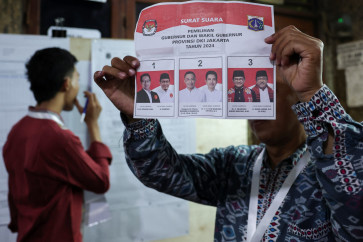Popular Reads
Top Results
Can't find what you're looking for?
View all search resultsPopular Reads
Top Results
Can't find what you're looking for?
View all search resultsNo shift on LGBT, death penalty or blasphemy
The government has sent a strong signal that it will not make any dramatic changes to its human rights stance and will probably reject all recommendations on LGBT rights, the death penalty and the Blasphemy Law
Change text size
Gift Premium Articles
to Anyone
T
he government has sent a strong signal that it will not make any dramatic changes to its human rights stance and will probably reject all recommendations on LGBT rights, the death penalty and the Blasphemy Law.
Dicky Komar, human rights director at the Foreign Ministry, said on Tuesday that in the next United Nations council meeting, which is scheduled for Sept. 20 to 21, it was most likely that the government would reject most of the 75 “noted” human rights recommendations submitted by other countries.
“We have not finished studying all the 75 recommendation, but in my view, it will be hard to accept them,” Dicky told The Jakarta Post.
In the third cycle meeting of the UN Universal Periodic Review (UPR) in Geneva, Switzerland, in May, 101 UN member countries delivered 225 recommendations to improve Indonesia’s human rights situation. The Indonesian delegation, led by Foreign Minister Retno LP Marsudi and Law and Human Rights Minister Yasonna Laoly, decided to accept 150 of these and noted the remaining 75.
The UPR was established in 2006 when the UN Human Rights Council was formed by the UN General Assembly. It was created to improve the human rights situation in all 193 UN member states and to encourage them to fulfill their human rights obligations. It does so by assessing the human rights records of the states and addressing violations.
Under the UPR mechanism, the reviewed state has the opportunity to make preliminary comments on the recommendations, choosing to either “accept” or “note” them. A few months later, the draft report and reviewed state’s response will be presented to a UN Human Rights Council meeting.
Dicky said there were various reasons why the noted recommendations could not be accepted by the government, citing a lack of understanding of Indonesian conditions and contraventions of Indonesian law as two of the most common reasons.
Among the recommendations that contravene the law are recommendations from Angola and Portugal that Indonesian abolish the death penalty for all crimes, while Spain and Liechtenstein called for the punishment to be abolished for drug-related crime.
“Capital punishment is still the law here and that is why we will only ‘note’ any call to abolish it,” Dicky continued.
The government is also unlikely to accept the recommendation from the United States and Germany to revoke the Blasphemy Law and blasphemy articles stipulated in the Indonesian Criminal Code (KUHP).
He also said the recommendations involving sensitive issues such as LGBT rights would also be rejected. At least 11 recommendations called on the Indonesian government to pay more attention to LGBT rights violations and to protect that community.
Sweden, for example, recommended that the government ensure laws and policies did not discriminate against any individuals including LGBT persons, while Ireland called for the prioritization of progress on equality and non-discrimination of LGBT groups.
However, Dicky said Indonesia was still considering whether to accept some 50 recommendations that were considered “harmless” and that would not have any sudden impact.
Separately, Yuli Rustinawati, head of LGBT rights group Arus Pelangi, said the fact that the country did not accept any of the 11 LGBT-related recommendations was proof that the nation was still failing to protect its citizens from discrimination.
“As the state has an obligation to protect its citizens, LGBT groups should automatically come under the same protection,” she said.
Arus Pelangi has recorded that in the first quarter of 2016 there were at least 160 incidents related to discrimination against the LGBT community, and Yuli suggested that this figure might only be the tip of the iceberg.










